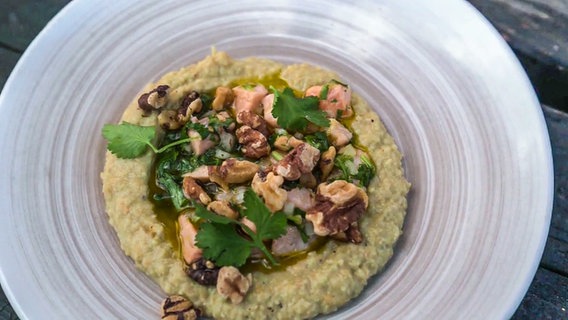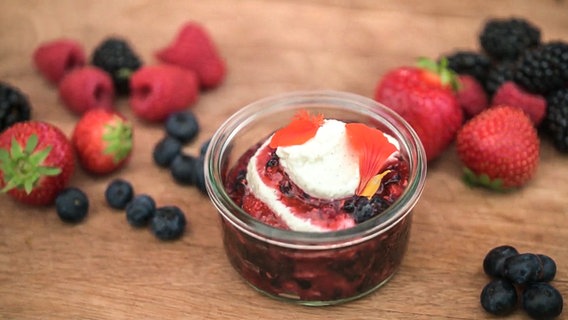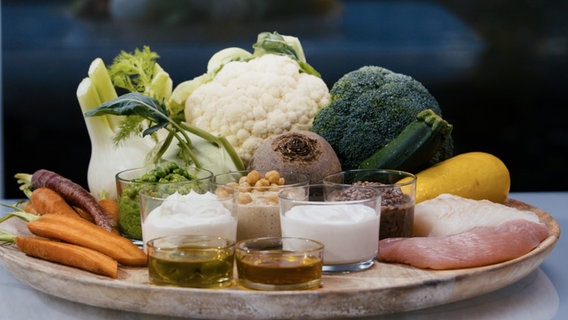Status: 05/22/2023 08:34 a.m
With a healthy diet, we can support the brain and even reduce the risk of Alzheimer’s. Drinking a lot, nuts, oatmeal, berries and chickpeas are part of the so-called brain food.
Although our brain makes up only one-fiftieth of our body weight, it uses up one-fifth of our energy. No wonder, because it’s always on duty – and always hungry. There are many foods that we can use to support our brain cells. But the most important thing is sufficient liquid.
Drinking a lot is important for the brain
Our brain needs nothing more than water. If there is not enough liquid, the brain cells, the neurons, shrink and no longer function properly. The brain can then no longer think well. To protect it from this, we should drink at least two liters of water a day.
Mediterranean diet improves blood circulation
Basically, unhealthy foods that promote heart attacks or strokes also promote circulatory disorders in the brain, which can go unnoticed for a long time. Therefore, one should pay attention to a vascular-healthy diet as early as possible. Even if it can be worthwhile at any age to change your diet to a healthier form of nutrition such as Mediterranean cuisine, the earlier you start, the greater the effect on the brain. Those who start eating healthier by the age of 50 have a lower risk of developing Alzheimer’s disease than those who don’t start eating until they are 80.
Glucose: fuel for concentration?
Our brain needs 120 to 140 grams of glucose per day to be sufficiently supplied with energy. If it gets too little, it switches to the back burner and loses its efficiency. In order to be able to think better again quickly, many people reach for glucose in such moments. But this is only an emergency solution, because a stable carbohydrate level is more important for brain function, while a fluctuating energy supply tends to limit the function of the gray matter.
Oatmeal is a good source of energy for the brain because it slowly increases the blood sugar level. Oats are also considered a pick-me-up, preventing nervousness, stress and concentration problems. The grain is an excellent supplier of nutrients, contains plenty of dietary fiber and vitamins B1 and B6, among other things.
Nuts: B vitamins protect the nerves
Nuts are rich in unsaturated fatty acids and B vitamins. Walnuts in particular are considered brain food because, in addition to omega-3 fatty acids, they also provide protein and vitamins B1, B2, B6 and E. The B vitamins are important for signal transmission between the individual nerve cells and for building the so-called myelin sheath, which as an insulating layer ensures that nerve impulses are transmitted quickly.
Chickpeas and soybeans: protein for the brain
For the internal exchange of information, i.e. for learning and remembering, our brain also needs plenty of amino acids. It gets it from protein, for example from eggs or quark, but also from plant sources: in addition to protein, chickpeas provide plenty of B vitamins and soybeans (e.g. soy milk, tofu) are not only good sources of protein, but also contain vitamins B1, B2 and B6, plus iron, magnesium and zinc. Edamame are unripe harvested soybeans that are also rich in plant-based omega-3 fatty acids.
Omega-3 fatty acids keep cell walls supple
Fish provides plenty of omega-3 fatty acids, specifically the fatty acids DHA and EPA. They have an anti-inflammatory effect and keep the walls of our cells supple. The gray cells also benefit from this, because inflammation is often partly responsible for the processes of deterioration in the brain. Nuts, especially walnuts, are plant sources of omega-3 fatty acids.
Berries are rich in antioxidants
Fruits such as berries, which are rich in so-called antioxidants, are also counted as brain food. These substances protect our gray cells from stress, for example. And tomatoes are one of them: They contain secondary plant substances that promote the production of the neurotransmitter serotonin.
Brain food supports mental health
Even if individual foods have no influence on our intelligence and cannot necessarily prevent the development of dementia diseases such as Alzheimer’s, a varied, healthy diet can reduce the risk. The aim is to avoid obesity, high blood pressure and diabetes – this also helps the brain’s resilience. And the earlier you take this into account, the greater this effect.
experts on the subject
Further information




